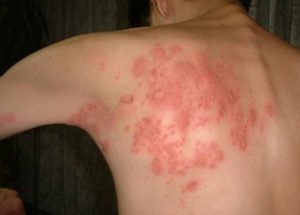Shingles is highly contagious. Every health worker and every patient should know some basic facts about this disease.
What is shingles?
Shingles is a nerve disease caused by the varicella zoster virus. It affects those who have already suffered from Chicken pox. The virus lies dormant in the body and awaits for the opportune time to strike. Shingles is commonly called as herpes in some parts of the world. This is because of the name of the virus that causes this disease. This virus is not to be confused with the virus that causes genital herpes or cold sores.
Who can get shingles?
Shingles is a disease that can affect any person. This is because it is a Viral Disease. Any person who is exposed to the virus is likely to get the disease. There are some people who are more at risk of suffering from the disease.
Who is at high risk of getting shingles?
Any person who has suffered from chicken pox as a child will be at a much higher risk of suffering from the disease. This is because of the fact that the virus lies dormant in the body till it is activated again because of favorable conditions. So, if you want to know if shingles is contagious, you should know that you may get the disease even if you have suffered from chicken pox as a child! Also, older people, usually above the age of 60 are at a higher risk than the general population. Similarly, those who have a poor immune system because of immune compromised diseases / poor nutrition can be at risk of suffering from shingles.
Shingles commonly affects only people who suffer from a decreased immune system. When the immune system is weak, it could be because of a pre existing disease. Or it could also be because of the lack of nutritious food.
The usual symptoms of shingles
Shingles can cause rashes. One of the complications of the disease is the infection of the rashes. Even the usual rashes are itchy and can cause problems. But when they become infected, it is important that you use antibiotics to treat the infection. Fever and chills can also occur in the person suffering from this type of herpes. Nausea and body ache are the other common symptoms seen.
What are the complications of shingles?
Loss of the skin color can be a complication of this disease. The change in the skin color occurs where the rashes were present. This area could become white and this could be seen as white patches. These hypo pigmented patches are different from Leprosy because sensation is present in these patches.
Ramsay Hunt syndrome: This is another of the common complications of shingles and this can cause problems in the face. The facial nerve can get affected in this condition. Then, you will suffer from various problems like pain in the ear and dizziness. Some people may even have decreased sensation in the face. Other than this, there could also be hearing loss that occurs as a complication.
Scarring: Blisters are formed because of the disease. They will leave a scar on the person. This can look ugly if you have it on your face. There are times when this scarring can occur on the cornea itself. This can mean that vision is affected to an extent.

Encephalitis: This is a very rare one of the complications. A person who is suffering this problem may have the infection spreading to the brain and because of this; the person may have confusion and headaches other than fever, which are all present in any damage to the brain.
Post herpetic neuraligia is another complication of shingles: This is a condition where there is pain even after the disease has disappeared. It is common in many people. The reason for the post herpetic neuralgia to occur is because of the damage to the nerves that had occurred when the disease was active.
In summary, the list of complications are as follows…..
Shingles is a disease that can cause serious complications and side effects. Some of the complications of shingles are as follows:
1. Pneumonia can occur in some people, scarring only in many others.
2. Blindness can occur in some people who are affected by the virus.
3. There could also be hearing problems because of the virus affecting the brain.
4. Viral encephalitis is a condition that is common and in this, the brain or the nervous system is affected by the disease.
5. Post herpetic neuralgia: This complication causes pain in the area where the shingles lesions was present. This kind of complication can occur in any person who had their nerves affected severely.
Every person needs to know about the complications of shingles to prevent the disease and to identify the disease at an early stage. Knowing all about the disease will also help in knowing how to prevent shingles and how to treat shingles.
Treatment of shingles
Early treatment is with use of pain medications and anti viral medication. If there are any complications caused by the disease, then these complications are treated symptomatically.
Prevention
Shingles can be prevented with the use of Varicella – Zoster virus vaccination.
Why is shingles so important for health workers to know about?
Since hospitalized patients can spread the disease to healthcare workers including nurses and doctors, it is important for each hospital and healthcare unit to identify those with susceptibility to the Varicella – Zoster virus. Those who are at risk need to be vaccinated as this disease is a common nosocomial or hospital infected disease.


